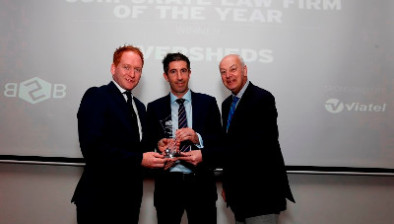High Court: John Delaney fails in privilege claim over documents seized by the Director of Corporate Enforcement

The High Court has rejected a claim by John Delaney that certain documents seized by the Director of Corporate Enforcement were subject to legal privilege.

About this case:
- Citation:[2022] IEHC 593
- Judgment:
- Court:High Court
- Judge:Ms Justice Leonie Reynolds
Mr Delaney asserted that 1,123 digital documents were privileged and should not form part of the ODCE’s investigation into the Football Association of Ireland (FAI).
Delivering judgment in the case, Ms Justice Leonie Reynolds noted that Mr Delaney had previously been ordered to provide more information to the ODCE regarding his assertions of privilege.
However, the only evidence of privilege provided by Mr Delany were “vague and nebulous claims which are wholly unsubstantiated”. Accordingly, the documents were not held to be privileged.
Background
The ODCE was engaged in a well-publicised investigation of the finances of the FAI. As part of the investigation, the Director seized a large number of documents from the FAI pursuant to a search warrant in February 2020. Approximately 285,000 filed were identified for examination.
Some of the documents related to Mr Delaney, who initially asserted legal professional privilege over approximately 29,500 files. Counsel was later appointed pursuant to section 795 of the Companies Act 2014 to report on the issue of privilege and this was delivered in May 2021.
The ODCE asserted that the crime-fraud exception applied to documents which were the subject of privilege, but the court declined to make a determination on this issue in a separate judgment (Director of Corporate Enforcement v. Cumann Peile Na hÉireann [2021] IEHC 651).
In October 2021, Ms Justice Reynolds made an order that Mr Delaney’s solicitor could attend the ODCE to review documents with a view to identifying the legal professional privilege which applied to those documents. By the time the matter came back before the court, the dispute had narrowed to a claim that 1,123 documents were privileged.
In an affidavit explaining his claim of privilege, Mr Delaney did not purport to provide a “deep dive” analysis of the counsel’s report. Instead, he stated that just over half the documents related to family law proceedings, while the remainder related to defamation proceedings, property transactions and a shareholder dispute. As such, 1,118 filed were purported to be subject to litigation privilege, while the remainder were subject to legal advice privilege or a combination of both legal professional privileges.
High Court
Delivering judgment on the issue of whether the documents were privileged, Ms Justice Reynolds began by briefly outlining the general case law on privilege. The court distinguished between legal advice privilege and litigation privilege, referring to well-known cases such as Smurfit Paribas Bank Ltd v. AAB Export Finance Ltd [1990] 1 IR 469 and Silver Hill Duckling v. Minister for Agriculture [1987] 1 IR 289.
The court held that, for legal advice privilege to be established, the communication must be between solicitor and client, where the solicitor was acting in a professional capacity. The document must also be confidential and contain legal advice rather than provide legal assistance.
For litigation privilege, a party must establish that a communication occurred if the litigation had commenced or was closely anticipated. Further, the document must have been created for the purpose of assisting the preparation of litigation and a court was not bound by a bald assertion relating to this issue (Artisan Glass Studio Limited v. Liffey Trust Limited [2018] IEHC 278). Finally, litigation privilege could only be asserted in respect of the same or closely related proceedings (Ryanair v. Revenue Commissioners [2018] IECA 222).
The court also noted that the burden of proof rested with Mr Delaney as he was the individual who asserted privilege (Colston v Dunnes Stores [2019] IECA 59). A party was required to produce “sufficient detail as to allow the court to make a finding regarding the intention behind the generation of the documents and explaining the nature, genesis and purpose of the documents in issue”.
Considering the evidence in the case, the court noted that Mr Delaney had not complied with her order from October 2021 to set out a meaningful and considered narrative in respect of each document over which he asserted privilege. Mr Delaney had been ordered inter alia, to identify the litigation over which each claim of litigation privilege was made. Mr Delaney claimed that he had complied with the “spirit of the Order” and required copy documents and more time to comply full with the order.
The court said that the request for more time had “a very hollow ring to it” because Mr Delaney had every opportunity to adequately review the documents to put forward “clear and cogent evidence” of privilege. Instead, the court stated: “The only evidence which has been proffered essentially amounts to no more than vague and nebulous claims which are wholly unsubstantiated. They are essentially so generalised as to lack substance and are devoid of any material evidence which could assist the Director or indeed this court with the task at hand.”
The “bald and blanket assertions” were “entirely inadequate” and the sufficiency of Mr Delaney’s “perceived compliance” with the spirit of the order was misconceived, the court said. He had “manifestly failed to comply with it in its entirety”.
The court agreed that it did not need to consider each and every individual document and that a consideration of the categories of documentation was sufficient. Even considering a sample of documents, the court was “left in the invidious position whereby I simply do not have the requisite information to carry out the necessary analysis”.
It was not the court’s role to make out a claim of privilege for Mr Delaney, the court said. In the circumstances, he had failed to discharge the necessary burden of proof.
Conclusion
The court rejected the assertions of privilege and would hear the parties on the correct form of order pursuant to section 795 of the Act.
Director of Corporate Enforcement v. Cumann Peile na hÉireann [2022] IEHC 593











